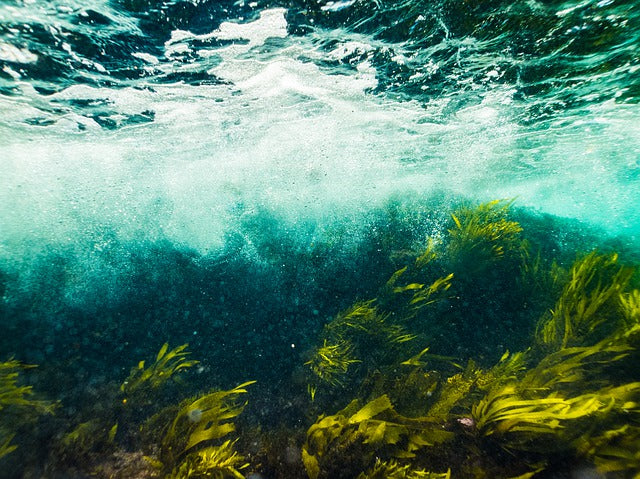Not a plant! Not an Animal! Not a Fungi! It’s Algae!
You’ve likely encountered many types of algae throughout your life - the nori wrap around your sushi, floating balloon-like seaweed at the ocean, your fish tank may have been taken over by clouds of green algae. Algae is in literally every marine environment, including in some unexpected places. Species have even been found growing in the ice of the Italian Alps. Often the words ‘Algae’ and Seaweed are used interchangeably. Although seaweed is algae and algae is seaweed, there are some differences between the two organisms.
Algae is one of the oldest organisms on the planet. In the fossil record, evidence of seaweed has been found that dates 3 billion years! They are one of the remaining primitive organisms and all land plants are descendants of some form of algae.
Some species are microalgae, a floating single cell that are invisible to the eye. These forms of algae can grow in both fresh and saltwater environments. They can be found in shallow lakes and ponds and varieties grow in the deep ocean. Chlorella and spirulina are two better known examples of micro algae.
 Image by Beefy Keithy from Pixabay
Image by Beefy Keithy from Pixabay
The seaweed species are multi-celled colonies or macroalgae. Seaweed always grows in shallow water, attached to something solid like rocks or a dock, and it is only found in salt water. There have been 320,500 species of algae collected and over 10,000 types of seaweed that have been named.

Because it uses photosynthesis to internally convert the energy of the sun into food, algae can be described as plant-like even though it doesn’t have separate structures such as roots, leaves and stems. All types of algae are rich in chlorophyll. Algae falls into a unique category “Protists” which is a catch-all classification for distantly related organisms.
The Use of Algae
In coastal areas, different types of seaweed have been used as food for thousands of years. Seaweed is currently being studied and used for its climate benefits. Like trees, seaweed can sequester carbon from the environment. International research is finding that Algae produces a high proportion of oxygen in the earth’s atmosphere.
 Image by Jack Drafahl from Pixabay
Image by Jack Drafahl from Pixabay
Because of its high nutrient content, algae are sought after ingredients in skincare. Out of the thousands of identified species of seaweed and algae, about a dozen species are being studied for their skincare applications.
When used in skincare, algae can act to thicken formulas, to bind moisture and as a source of antioxidants. Algae is rich in amino acids, minerals, vitamins and healthy Omega-3 fats. The presence of Vitamin C means algae is a beneficial antioxidant. High levels of Vitamins A, B, and E are also present. The antioxidant properties of algae are used in formulas to help reduce the amount of stress caused by the action of free radicals on the cells of the skin.
Compounds found in algae are thought to improve collagen production, and in some species of algae there are enzymes which prevent collagen from breaking down. Collagen is a protein that is the key building block for our body’s structures like the bones and skin. As we age, our body will produce less collagen.
Algae extract may also reinforce the skin’s barrier function which prevents moisture from evaporating out of the cells, a main cause of dry skin. Supporting the skin barrier can improve the suppleness of the complexion. Some forms of algae are used as brightening agents, which helps the skin appear radiant. Creating supple, deeply hydrated skin from the inside out reduces the appearance of fine lines.
We use algae extract in several of our products and apreciate the benefits this simple but complex ingredient brings.
The Aspen & Shea Butter Moisturizer combines rich botanicals with the enriching properties of Shea Butter with collagen promoting algae extract. https://www.heliotropesf.com/products/aspen-shea-butter-moisturizer
Algae extract brings its antioxidant properties to the toning and soothing Cucumber Hydrating Mask.
 Image by Kerstin Riemer from Pixabay
Image by Kerstin Riemer from Pixabay



Leave a comment